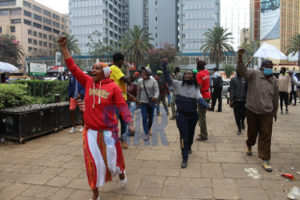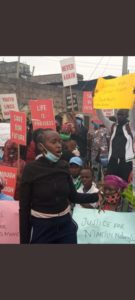Enough is Enough: Stop Killing Women Human Rights Defender
Nairobi, 5 January 2022
We, the Women Human Rights Defenders (WHRDs), civil society organizations and social movements condemn the killing of Elizabeth Ibrahim Ekaru-HSC, an astute women’s rights advocate, a peace champion as well as an environmental and land rights defender from Isiolo County.
Elizabeth was murdered on Monday 3 January 2022 allegedly by her neighbor over a land dispute. She was attending a burial when she was lured to her death trap by the suspect who called her aside only to commit the heinous act by stabbing her severally, something that comes off as premeditated. The suspected murderer was apprehended by a mob and is currently recuperating at a local hospital under police guard.
The barbaric murder of woman human rights defender Elizabeth brings to the fore the pervasive nature of incidences of violence against women and girls in Kenya. Her killing while defending land rights, is a true testimony of the risks, challenges and attacks that Women Human Rights Defenders continue facing in the line of their work.
We are startled by the escalating attacks on women and more so WHRDs in Kenya. Defenders Coalition has documented alarming cases of femicide in the past few years pointing to a cavalier attitude towards women in the society.
On 15 July 2021, a woman human rights defender and environmentalist from Kiambu County- Joannah Stutchbury was brutally murdered for standing up against environmental injustice in Kiambu Forest. The government, through the Office of the President and Director of Criminal Investigations, promised speedy investigations and
conclusion of the matter to ensure action is taken against the perpetrators(s). Worryingly, there has not been a single arrest related to the killing of Joannah and the persons responsible for her death are still walking free.
In August 2021 two women environmental activists from the Owino Ohuru area in the coastal region were also targeted for attack when pursuing justice for residents and victims of environmental pollution in Owino Ohuru Slums in Mombasa.
The above cases are classic examples of the price that women human rights defenders have to pay for protecting human rights and advancing the social, economic, cultural and political rights under the Constitution of Kenya 2010.
Elizabeth has been recognized severally including being the recipient of the Head of State Commendation Award for her courage and role at the frontline defending human rights. She is also part of the National Network of Women Human Rights Defenders, which is convened by the Defenders Coalition.
We, therefore, call on the following from relevant offices of the government:
About Elizabeth Ibrahim Ekaru
Elizabeth Ibrahim Ekaru was a dedicated WHRD and a women’s rights community leader who spent most of her life fighting for the rights of women, youth and children from pastoral communities. She was a renowned gender activist who spread the message of women empowerment through educating the girl child and was also involved in several initiatives of economically empowering women from her community through village savings and loan associations and other self-help groups. Elizabeth was also a climate change activist and she was heavily invested in economic empowerment of women through agribusiness whereby she would work closely with other women from pastoral communities to grow food crops to counter the harsh effects of climate change in the areas which are susceptible to drought and famine. She was also an advocate for the land rights of indigenous women and she met her untimely demise while defending her land ownership rights. Elizabeth was an icon of peace having started her journey as the Chairperson of the Turkana Dancer[1]s group back in 1998, where together with other community members, they would spread the message of peace through artistry.
Elizabeth was a member of the Isiolo Peace and Resolution Committee, a caucus formed to spearhead peaceful co-existence and cohesion among the different communities in Isiolo County. She has also served as the chairperson of Maendeleo ya Wanawake, Isiolo Central Division at some point in her life. Elizabeth has in the past found herself in the middle of cattle rustling tussles whereby her home was targeted by cattle rustlers from the neighboring communities and she used this as a motivation to continue fighting for peaceful co-existence between the communities. She always felt that most of the conflicts at the time were a result of misunderstanding and bad leadership, and she, therefore, sought to try and establish good relations with the other communities by getting involved in peace talks and campaigns.
Coming from a deeply patriarchal society, she was faced with so many challenges and in some instances, she had to fight to be included in peace negotiations because traditionally, women were not part of the peace building processes which were only a reserve for elders and male counterparts. Elizabeth was very instrumental in bringing calm not just in Isiolo but also in the neighboring counties i.e. in Garissa whereby she represented the voices of women and championed the cause for equal compensation for both male and female victims of clashes. Further, she was a mentor to young girls and women in different counties and an FGM advocate.
Elizabeth bagged several awards in her journey as a women’s rights leader. These include the Head of State Recommendation Award during the Mwai Kibaki regime, at a time when she was serving as the chairperson of the Maendeleo ya Wanawake organization in Isiolo. This followed her efforts to resolve conflict during the ethnic clashes in the Rift Valley region around the year 2005, involving unrest in Kirema, Mai Mahiu, and Naivasha. Elizabeth continued to advocate for the rights of children and women, who she felt were the most affectednby armed conflict and were also marginalized in the peace-making processes due to the patriarchal nature of the communities.
Elizabeth joined the Isiolo Voice of Women Network as vice-chairperson, a role in which she continued to fight for the rights of young women and girls and also to promote the agency and economic empowerment of women. She was also part of caucuses such as the Burat Citizen Forum. Due to her commitment and advocacy, Elizabeth was nominated to represent Isiolo in the BOMAS national constitutional conference as part of the process that led to the creation of the 2010 Constitution of Kenya. Elizabeth, through her work and determination, was appointed peace ambassador representing a group of women from 12 counties who had a goal of enhancing peace and security in the different areas they came from. At the time of her death, Elizabeth was a board member of the Isiolo Gender Watch.
The excerpt about the work of Elizabeth Ibrahim Ekaru has been compiled by our CSO partner Katiba Institute as in its publication TheUntold Stories of Women’s Rights Leaders. All rights reserved with Katiba Institute
ENDS
Signed by:
Individuals
1)Salome Nduta- lWHRD
2) Emily kwamboka-IHRD
3)Florence Kanyua – WHRD
4) Naomi Vulenywa Barasa WHRD
5)Joyce Adhiambo (MVSN)-WHRD
6)Caren Wambui Kiarie-WHRD
7) Regina Opondo – WHRD
8)Isaiah Epuri
9) Susan Owiti-WHRD
10) Grace Lolim
11) Warima Muggi-WHRD
13) Pauline Kinyua
14) Michelle Mwanahamisi- WHRD
14)Andrew Mola Ilere-(Human rights Advocate,Mediator and Negotiator)
15) Dennis Hombe
[1] https://katibainstitute-my.sharepoint.com/:b:/g/personal/mwanahamisi_katibainstitute_org/EcrY4cjjD-xAo0cqr7siCuUBHLjecXpHXfOEZGyaoXdIJA?e=NdAwWy
TORs FOR A CONSULTANCY FOR DEVELOPING AN OPERATIONAL PLAN
TERMS OF REFERENCE FOR A CONSULTANCY FOR FACILITATING THE DEVELOPING AN OPERATIONAL PLAN (2022) FOR THE IMPLEMENTATION OF THE DEFENDERS COALITION STRATEGIC PLAN 2020-2025
Contract Duration: 10th -17th January 2022
Contract Period: 7 working days
Who we are
Defenders Coalition (The National Coalition of Human Rights Defenders–Kenya) is a national organization incorporated in the Republic of Kenya as a Trust. Its mission is to strengthen the capacity of human rights defenders (HRDs) to work effectively in the country and to reduce their vulnerability to the risk of persecution, through protection, capacity building, and advocacy for a favorable legal and policy environment. Established in 2007, NCHRD-K is the only national organization that works primarily for the protection of HRDs.
The Defenders Coalition’s strategic plan 2020 – 2025 outlines the vision, mission and strategies of realizing the same. The strategic plan is futuristic and encompasses alignment to global human rights instruments as it seeks to effectively reposition the Defenders Coalition in the rapidly changing environment especially in technology. The identity of the plan is to present HRDs with holistic approaches geared towards a safe and secure environment for all HRDs through an established rapid response mechanism, capacity building and knowledge management structures.
Purpose and elements of the Operational Plan
The Operational Plan is the specific plan which prescribes how Defenders Coalition will use its resource towards the implementation of the 2020-2025 Strategic Plan. It guides the day to day activities of the secretariat and its work plan for the coming year in order to achieve the goals and result areas set in the Strategic Plan. The Operational Plan identifies the activities and events that will be conducted by the Secretariat as aspired in the Strategic Plan.
In a nut shell, the Operational Plan identifies the following key elements with a view of guiding the implementation of the identified activities:
Identify key fundraising opportunities
Expected output
The expected outputs of the consultancy are;
Scope and methodology of the Work
In preparing the Operational Plan, the Consultant is expected to undertake a close consultation of the Strategic Plan to identify activities and events for the year 2022. The Consultant is required to submit a proposal which indicates the methodology on how the Plan will be developed and highlights the content of the Operational Plan. The proposal will be assessed in the manner Defenders Coalition deems suitable. After a consultation is held and the proposal is approved, the Consultant will then guide the secretariat on developing the Operational Plan. The Consultant then will submit the final Operational Plan document.
Reporting lines
The Consultant will work under the direct supervision and guidance of the Executive Director and the Head of Programs/Operations. However, during the course of work the consultant will be expected to liaise and consult directly with Defenders Coalition’s financial budgets. Time Frame The total amount of time given for the preparation of the Operational Plan is a 4 day period.
Application
The following should be included in the application:
Application should be submitted to info@defenderscoalition.org and gloria@defenderscoalition.org no later than Wednesday, 5th January 2022 with the subject line CONSULTANCY FOR DEVELOPING THE OPERATIONAL PLAN 2022
Only shortlisted candidates will be contacted, and the final decision reached no later than 7th January 2022.
Disclaimer: Defenders Coalition is an equal opportunity employer, committed to ensuring diversity, inclusivity and gender equality within our organization and work. Defenders Coalition, thus will recruit/award the consultancy to the most qualified person /company irrespective of race,color, marital status, sexual orientation, religion, gender, ethnicity. Only successful candidates will be contacted.
DOWNLOAD THE TERMS OF REFERENCE HERE
REQUEST FOR PROPOSALS – EXTERNAL AUDIT SERVICES
Introduction:
The National Coalition of Human Rights Defenders-Kenya (NCHRD-K), currently Defenders Coalition requests proposals for provision of external audit services for the year ending 31st December 2021.
The Defenders Coalition is the national coalition of Human rights defenders in Kenya that works to strengthen the capacity of Human Rights Defenders (HRDs) to work effectively and to reduce their vulnerability to the risk of persecution by advocating for a favourable legal and policy environment in Kenya.
Our mission is to Champion the safety, Security and wellbeing of human Rights defenders focusing on four main areas as follows:
The external audit of Defenders Coalition for the year ended 31 December, 2021 is an internal governance requirement necessary to ensure that the management, with delegated authority of the trustees, have discharged their legal responsibilities in respect of preparing the annual report and financial statements, and subjecting them to the correct level of external scrutiny. For Defenders Coalition, funding is obtained on the strength of audits and the donors are therefore a major interested party.
Main Objectives of the audit:
The objective is to carry out an independent audit of the books of accounts in accordance to International Financial Reporting Standards (IFRS), and to express an independent opinion in accordance to International Standards of Auditing (ISA700). In addition, the auditor is expected to review whether financial reports are in agreement with instructions as stipulated in agreements between Defenders Coalition and its donors.
Auditor’s duties & responsibilities:
Auditor’s profile:
Application procedure:
Interested firms that meet the above minimum requirements are encouraged to send their applications alongside copies of the following documents to the address below and by 8 January 2022: –
The Chair
Board of Trustees
Defenders Coalition
P.O. Box 26309-00100
Nairobi
Email: info@defenderscoalition.org
Website: www.defenderscoaliton.org
Any form of canvassing shall lead to automatic disqualification.
Defenders Coalition is an equal opportunity employer, committed to ensuring diversity, inclusivity and gender equality within our organization and work. Defenders Coalition, thus will recruit/award the consultancy to the most qualified person /company irrespective of race, color, marital status, sexual orientation, religion, gender, ethnicity. Only successful candidates will be contacted.
DOWNLOAD THE TERMS OF REFERENCE HERE
TERMS OF REFERENCE FOR CONSULTANCY TO DEVELOP THE DEFENDERS COALITION RESOURCE MOBILISATION STRATEGY
Expected start date: Immediately
Contract Period: 21 working days
Who we are
Defenders Coalition (The National Coalition of Human Rights Defenders–Kenya) is a national organization incorporated in the Republic of Kenya as a Trust. Its mission is to strengthen the capacity of human rights defenders (HRDs) to work effectively in the country and to reduce their vulnerability to the risk of persecution, through protection, capacity building, and advocacy for a favorable legal and policy environment. Established in 2007, NCHRD-K is the only national organization that works primarily for the protection of HRDs.
The Defenders Coalition’s strategic plan 2020 – 2025 outlines the vision, mission and strategies of realizing the same. The strategic plan is futuristic and encompasses alignment to global human rights instruments as it seeks to effectively reposition the Defenders Coalition in the rapidly changing environment especially in technology. The identity of the plan is to present HRDs with holistic approaches geared towards a safe and secure environment for all HRDs through an established rapid response mechanism, capacity building and knowledge management structures.
Objective
The goal of this consultancy is to develop a framework for ensuring diversification of sources of income and decreased dependence from depreciating resources from the donor community.
Specific Objective
The specific objective of the strategy is to strengthen the capacity of the organization in on sustainability.
Justification
The Defenders Coalition, as many other civil society organizations, is faced with a complex funding environment, characterised by a global economic downturn and related financial crisis, shrinking domestic assistance, public deficits in some donor countries and shifting donor priorities. Furthermore, the Defenders Coalition has had a review on its strategic ambition which came in place in 2020 and expected to run until 2025. The strategic ambition reflects the growing appetite for the services of the Defenders Coalition among growing communities of HRDs, the desire for excellence in service delivery to the beneficiaries of our work as well as securing the future of the organization. With this, the financial allocation to meet these needs has drastically grown over time.
This requires a robust forward-looking resource mobilization strategy which takes into account this changing donor landscape as well as assesses lessons learned from past and current resource mobilisation efforts. This strategy must also explore new aid modalities and actors and outline a systematic and strategic approach to leveraging existing and new partnerships as well as recommend how to diversify the resource base to ensure success of the Defenders Coalition’s mandate.
To this end, the Defenders Coalition is seeking a qualified consultant to develop a resource mobilization strategy with a proposed action plan responsive to the Defenders Coalition’s strategic vision, objectives, and results-orientation.
Scope of Work
Scope of work Specific tasks of the consultancy will include:
Deliverables:
Profile of the Consultant(s)
The consultant(s) should have the following qualifications/expertise:
Interested applicants shall present to the Defenders Coalition both financial and technical proposal for the project. The technical proposal must cover all-important aspects of the project and the financial proposal should cover professional and support cost.
Application Procedure
Interested applicants who meet the job requirements and qualifications and with the right personal attributes are invited to complete and submit the following:
All applications should be sent to Defenders Coalition Executive Director via info@defenderscoalition.org copy gloria@defenderscoalition.org by Thursday, December 30th 2021 with subject line CONSULTANCY FOR DEVELOPING THE DEFENDERS COALITION RESOURCE MOBILIZATION STRATEGY
Disclaimer
Defenders Coalition is an equal opportunity employer, committed to ensuring diversity, inclusivity and gender equality within our organization and work. Defenders Coalition, thus will recruit/award the consultancy to the most qualified person /company irrespective of race, color, marital status, sexual orientation, religion, gender, ethnicity. Only successful candidates will be contacted.
DOWNLOAD THE TERMS OF REFERENCE HERE
TERMS OF REFERENCE FOR A CONSULTANCY TO DEVELOP A STANDARD TRAINING MANUAL FOR ELECTIONS MONITORS, DATA COLLECTION TOOLS AND TRAIN ELECTIONS MONITORS ON THE USE OF THE TOOLS IN READINESS FOR DATA COLLECTION DURING THE ELECTIONS PERIOD IN 2022 GENERAL ELECTIONS
Expected start date: Immediately
Contract Period: 21 working days
Who we are
Defenders Coalition (The National Coalition of Human Rights Defenders–Kenya) is a national organization incorporated in the Republic of Kenya as a Trust. Its mission is to strengthen the capacity of human rights defenders (HRDs) to work effectively in the country and to reduce their vulnerability to the risk of persecution, through protection, capacity building, and advocacy for a favorable legal and policy environment. Established in 2007, NCHRD-K is the only national organization that works primarily for the protection of HRDs.
The Defenders Coalition’s strategic plan 2020 – 2025 outlines the vision, mission and strategies of realizing the same. The strategic plan is futuristic and encompasses alignment to global human rights instruments as it seeks to effectively reposition the Defenders Coalition in the rapidly changing environment especially in technology. The identity of the plan is to present HRDs with holistic approaches geared towards a safe and secure environment for all HRDs through an established rapid response mechanism, capacity building and knowledge management structures.
Background:
The Defenders Coalition is cognisant of the role that (W)HRDs play during elections period in Kenya as elsewhere globally. (W)HRDs are at the centre of democratic processes as they actively monitor the situation of human rights during the period leading up to elections, during elections and after elections. The role supersedes just elections monitoring. They also passionately work to protect and promote human rights for all, seek justice and other remedies for victims and demand accountability for perpetrators of violation within and without the elections period. If documentation of facts and information is not properly done, the victims may end up not receiving justice,ending up exposing their lives or that of the victims of the violations to unprecedented risks.
It is on this premise that the Defenders Coalition is seeking the services of a consultant to develop a standard training manual as well as standard data collection tools(for use within and without Defenders Coalition and among partners) and to enhance the capacity of (W)HRDs with skills in risk assessment and reporting as well as monitoring, documentation and reporting (MDR). The consultant shall train 80 elections monitors on MDR and use of the data collection tools developed. The skills development training is intended to result in a pool of trainers of trainers from among the (W)HRDs who will continue strengthening the capacity of other (W)HRDs at the community level during and beyond elections period.
Scope of Work
Human Rights Defenders continue to work in an environment that is extremely dynamic. The risks associated with the work of promoting human rights is real but also the risk of exposure and severity differ, but increasingly women HRDs are prime targets. The Defenders Coalition addresses these issues by regularly enhancing the capacities of (W)HRDs to be able to do their work in a safe manner.
The Defenders Coalition is therefore seeking to engage a consultant who shall develop a training manual for (W)HRDs in Kenya to strengthen their capacities to be able to do the work of monitoring documenting and reporting on human rights violations during the 2022 elections season. The manual must explore and be specific to WHRDs concerns and mitigation.
The consultant will also be tasked to compile specific reports on the situation of human rights from the 47 counties in the period August – December 2021. The information is domiciled at Defenders Coalition following ongoing election related monitoring of rights violations.
In summary, the consultant shall;
The materials to be developed by the consultant should put into consideration diverse human rights based approaches to monitoring and documentation and reporting on violations. The training modules and materials will be discussed and approved by the Defenders Coalition team before the commencement of the training.
Deliverables:
Profile of the Consultant(s)
The consultant(s) should have the following qualifications/expertise:
Interested applicants shall present to the Defenders Coalition both financial and technical proposal for the project. The technical proposal must cover all-important aspects of the project and the financial proposal should cover professional and support cost.
Application Procedure
Interested applicants who meet the job requirements and qualifications and with the right personal attributes are invited to complete and submit the following:
All applications should be sent to Defenders Coalition via: info@defenderscoalition.org copy elections@defenderscoalition.org by Friday, 30th December 2021 with subject line CONSULTANCY FOR DEVELOPING TRAINING MANUAL FOR 2022 ELECTION MONITORING
Disclaimer
Defenders Coalition is an equal opportunity employer, committed to ensuring diversity, inclusivity and gender equality within our organization and work. Defenders Coalition, thus will recruit/award the consultancy to the most qualified person /company irrespective of race, color, marital status, sexual orientation, religion, gender, ethnicity. Only successful candidates will be contacted.
Mr. Joel Ogada was found guilty and sentenced at the Chief Magistrate Court in Malindi CR case file number 177 of 2016 on Thursday 2 December 2021.
The magistrate, Hon. Ivy Wasike, ruled that Ogada will serve six months behind bars despite the spirited defense against the guilt verdict by Mr Ogada and his lawyer who explained that Ogada was land rights activist who was persecuted because of his campaign against the forceful encroachment of community land by a salt mining company which had sustained a campaign of criminalization of activists through the justice system.
“This is a matter of concern to all environmentalists and land rights activists who express dissent over illegal acquisition of their property. It is an outrage as this means that any activist who dares stand against powerful corporations will be imprisoned,” said Kamau Ngugi, Executive Director of the Defenders Coalition.
Mr Ogada who has a farm next to the company has been spearheading a campaign against corporate land grabbing in Kilifi County for which he has been under extreme pressure from the company to vacate his land.
He described to the court that the charges were trumped up as part of the campaign to criminalize his land right activism and for standing up against grabbing of his land and that of other community members by business entities.
The land rights activist was arrested from his home in Kinagoni Village at around 6 PM on 14 March 2016 by security officers from a local police station who were accompanied by security guards of Kurawa Salt Mining Company. One of the guards made a complaint at Marereni Police Station alleging that Mr. Ogada threatened to kill him.
Mr. Ogada pleaded not guilty and explained to the court how the company had used all manner of tactics to harass, intimidate and persecute him because of not acceding to the company’s spirited campaign to expand its land territory.
He stated that he had not threatened anyone and that charge of threatening to kill Mr. Laban Simiyo Wanjala, a security guard of Kurawa Salt Company, contrary to section 233, Subsection 1 of the Penal Code was a fabrication.
Restraining Order obtained in 2004
In 2004, Mr Ogada who has been involved in a long standing land dispute with the salt company obtained court orders restraining Kurawa Salt Mining Company from acquiring his land and that of his community members.
Despite the orders, the company did not cease its attempts to acquire land leading to criminalization campaign by the salt company against Mr. Ogada
Family stigmatized and alienated
Joel Ogada’s frequent arrests and imprisonment adversely affected his family who became the targets of threats when he was imprisoned in 2013.
It is worth noting that the threats and intimidation from the salt farm and authorities did not cease at Ogada. In a separate incident and while in prison, Mr, Ogada’s wife was arrested, along with 6 others, and charged with arson and destruction of property at the Kurawa salt farm.
The wife and six others were released and the case is still ongoing in court.
In another ploy to ensure that the family and friends of Joel Ogada felt intimidated and disappeared from the disputed land, his brother, David Ogada, who Joel had asked to watch over his property while he was in prison, was arrested in November 2014 and charged with trespass and being in possession of bhang (marijuana), allegations he denied.
The perception among the community and his family is that Joel is being persecuted by the local administration and the Kurawa salt farm in order to intimidate him and force him to vacate the disputed land and abandon his human rights work
About Mr. Joel Ogada
He is a member of the Kubuka Farmers Association, Joel Ogada has been on the frontline of advocating for land and environmental rights in his Coastal community for years. Joel advocates against the human rights violations committed by the neighbouring salt companies in Marereni through their expansion into the surrounding indigenous community’s ancestral lands. Joel Ogada, a resident of Kanagoni, the disputed piece of land that neighbors the Kurawa salt farm, has faced numerous threats due to his activism and efforts to resist evictions by the Kurawa Salt Company.
CLIMB FOR JUSTICE MOUNT KENYA HIKE 2021 POSTPONED
1 December 2021, Nairobi, Kenya
The Climb for Justice Initiative hike aimed to summit Lenana Point in Mount Kenya set to take place between 9-14 December 2021 has been rescheduled to 4-9 March 2022.
As the organizers of this initiative, we realize that December 2021 is a hard-pressed month and majority of the climbers have not realized the physical preparedness and fundraising target to enable them to hike comfortably and safely.
As you are aware, this wellbeing initiative mainly aims at raising funds to set up Haki Village – safe space for Human Rights Defenders’ wellbeing, training, research, and creativity.
Through your support, we have so far raised KES 8.4 million through various hikes. We hope that through this momentous hike we can meet the 10 million target- target by 2021.
The fundraising target per climber is KES100,000 (USD1000) of which actual hiking cost is Kshs. 40,000 and the other Kshs. 60,000 supports the fundraiser. We urge you to continue supporting the climbers for justice whenever they knock on your doors for support to reach their personal fundraising targets.
The proposed route for the upcoming hike is the Chogoria to Lenana point and descent from the Naromoru route. A very scenic route but strenuous. This new guidance will give the climbers time for ample preparation for physical fitness and acclimatization.
We urge you to indicate your interest of joining us for the hike by messaging us via WhatsApp 0716200100 or email communication@defenderscoalition.org. There is a team on standby to prepare material to support your fundraising efforts.
Kamau Ngugi, Executive Director
Defenders Coalition
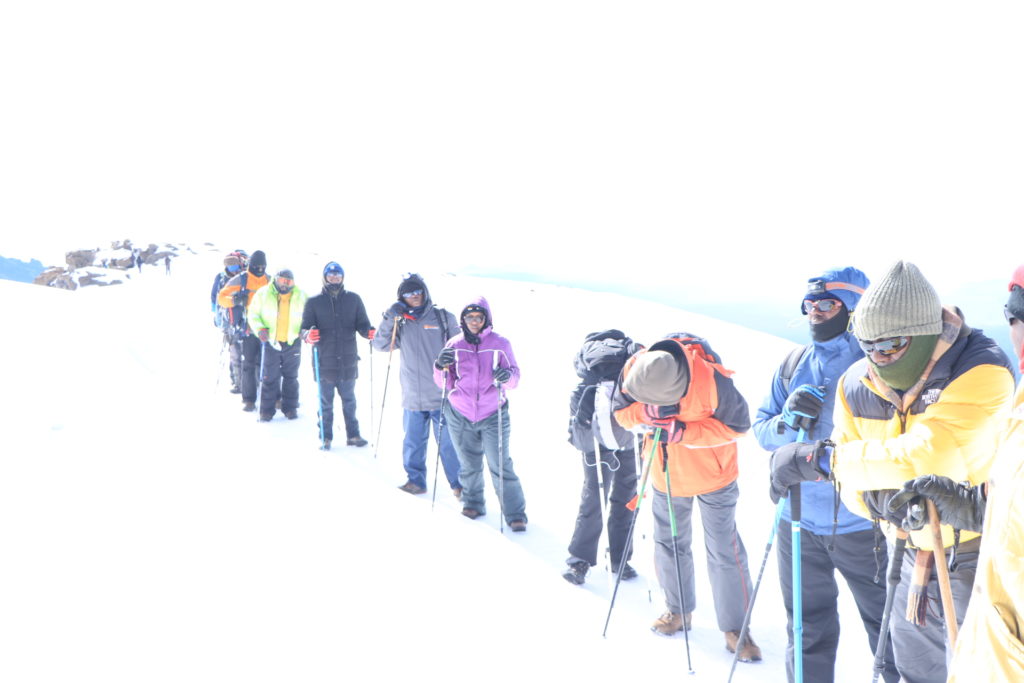
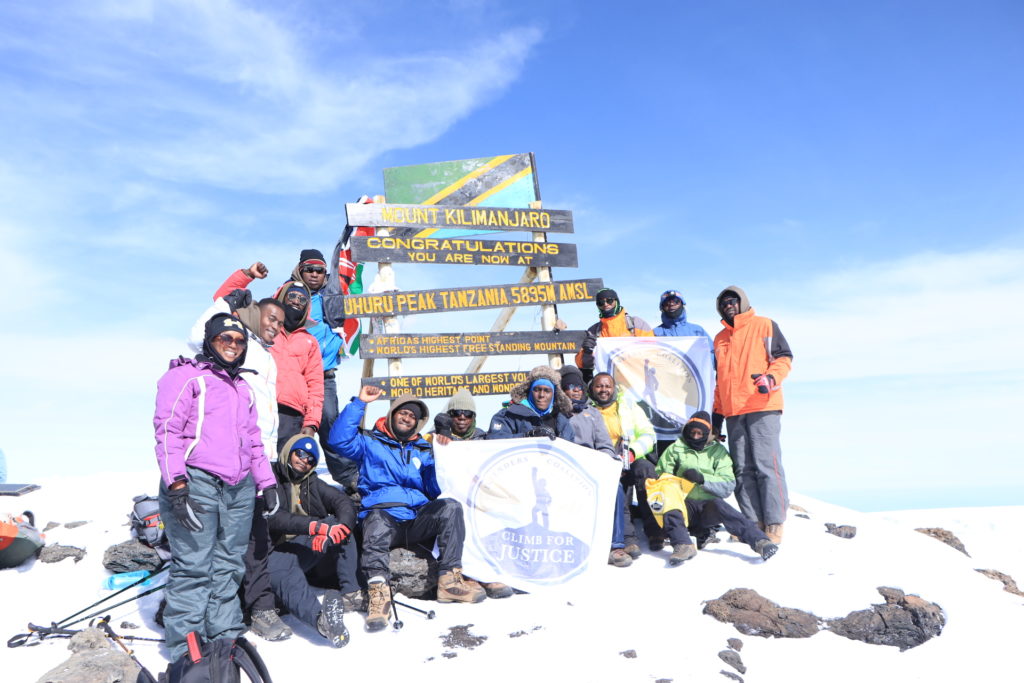
STATUS REPORT ON THE SITUATION OF WOMEN HUMAN RIGHTS DEFENDERS IN KENYA DURING COVID-19 PANDEMIC 2020
For someone to be regarded as a human right defender (HRD), these individual acts to address any human right issue. They champion rights in their daily acts of service and stand for the respect constitution and other relevant laws. The declaration on human rights defenders acknowledges HRDs as people who, individually or with others, act to promote or protect human rights.
HRDs face numerous challenges in the course of their work directly as a result of their work and/or during the course of their work. These challenges are often gendered with Women Human Rights Defenders bearing the brunt of these due to cultural norms and societal structures.
Women have important roles to perform within the society. Roles that cut across various spheres of society including social, political, economic, cultural and religious. For this, women are often regarded as pillars of any given society. With family being regarded as the foundation of the society, women’s role as caregivers and homemakers is often emphasized on this front. This means that everything else a woman does; she carries the responsibilities of her home along.
It is often noted that at the break of a calamity, it is the woman who suffers most. Such has been the case with the Covid-19 pandemic that almost brought the world to its knees.
It is in this regard that Defenders Coalition undertook a survey to assess the situation of women human rights defenders (WHRDs) during the Covid-19 pandemic and appreciate their resilience at the face of a global pandemic yet still defending and promoting human rights.
The survey aimed to;
1. Highlight the resilience and innovation of WHRDs
2. Examine the role and expectations of and for WHRDs within a society
3. Identify partners and existing mechanisms that support the work of WHRDs
From the exercise, the role of WHRDs in the society was identified as a difficult one and often regarded as individuals with mixed and/or different priorities from those expected of them by the society they live in. For a WHRD to be active and vocal in her society, she is regarded as remiss of her responsibilities at the home front. However, this period really highlighted the importance of WHRDs as leaders, both at the home and community fronts.
PRESS RELEASE
WINNERS OF THE 2020 HUMAN RIGHTS DEFENDERS AWARDS ANNOUNCED
27 November 2021 – Nairobi, Kenya.
On 26 Novemnber 2021, Defenders Coalition (National Coalition of Human Rights Defenders in Kenya) and the Working Group on Human Rights Defenders feted outstanding work of defending human rights by rights activists despite great difficulties. The award winners were announced by Former Chief Justice Dr Willy Mutunga led panel of judges at a ceremony hosted by Ambassador Caroline Vicini at the Residence of Swedish Ambassador in Nairobi.
The 2021 winners are:
The 2021 HRD Awards marks the sixth consecutive year in which grassroot based and national level activists are assessed on their impactful human rights work by an independent selection panel of eminent Kenyans. The winners of this year Awards exhibited civil courage, leadership, innovation, demonstrable impact of the Human Rights work on the community, and creativity.
“Every community has unsung heroes and heroines who fearlessly but diligently enable the realization of universal human rights under very difficult circumstances. We are delighted that we have the opportunity to celebrate them,” said Kamau Ngugi, Executive Director of the Defenders Coalition.
Kamau Ngugi who moderated the event further observed that while we are honouring them, the working environment for activists is deteriorating and more efforts by rights defenders was required to safeguard our people.
“The good deeds of these courageous individuals are marred by persecution from the state and other private individuals who are keen to curtail the work of activists. More mechanisms need to be put in place to ensure protection against any form of targeting.”
The objective of the Human Rights Defenders Awards ceremony is to recognize, honor and appreciate the extraordinary work of Human Rights Defenders in the protection of human in their capacity as agents of social change and transformation. An important aim of the awards is to improve the safety and protection of Human Rights Defenders as they benefit from the visibility and international recognition.
“Increasingly, we are realizing the need to put in place mechanisms that tell the stories of human rights defenders as individuals and groups. Their role in the promotion of democracy and realizing universalism of human rights is critical. We will continue to explore more ways of collaborating to promote their safety.”
The Awards continue to inspire encourage and passion among young and upcoming activists to keep up the good fight, with the aim of keeping their societies safe now and in the future. As such Defenders Coalition as co-chair with the Embassy of Sweden of the Working Group for Civil Society and Missions for rights defenders will continue providing the platform for recognition and appreciation of frontline defenders.
For more information, or interview requests, please contact:
Notes to the Editors:
Further details on the 2021 Winners:
HRD OF THE YEAR AWARD WINNERS
Njeri Migwi
Njeri Migwi is a woman human rights defender, a mother of nine babies, 5 humans and four cats.
She is the Co-Founder and Executive Director of Usikimye, a platform established to offer refuge for victims and survivors of sexual and gender based violence. With others, Njeri has put together safehouses that ensure that SGBV victims have a haven against the violations directed at them. She thrives in humour , is an avid RPG gamer and is an avid LOTR fan.
The idea of coming up with safe houses for victims of SGBV sparked when she was experiencing SGBV but had nowhere to call home, away from the perpetrators. She realized that many victims and survivors of SGBV lacked a place to rest while they sought to hold the perpetrators to account.
She quickly closed the gap and established Usikimye.
Najeri is a firm believer of bouncing back from the moments of darkness associated with the SGBV.
Her love for defending and promoting other people’s rights does not end there. She has a soft spot for children. Together with others, Njeri co-founded Mama Rescue, an organization that responds to children in distress. She also supports a feeding programme , where at least 4000 mouths are fed every week. Njeri also helped establish a mobile library and arts program to give alternative learning models for kids to kids and have fun while at it.
Through her leadership, Uskimye rescued numerous women and girls, children and infants. While her passion lies in women , she has never shied from rescuing men in violent relationships.Through her leadership, they have re-homed various members of the LGBTQ community to different neighborhoods due to an escalating corrective violations such as the gang rape silent pandemic.
Her work is guided by the awareness she has around SGBV issues. She employs community centered practices that ensure that local problems are addressed using locally available response mechanisms for reprieve. She hopes that her advocacy work will bear fruit at the preventive level where attitudes surrounding harmful cultural practices that perpetuate SGBV are completely eliminated.
Athumani Abdulla Mohamed
Athumani is a Muslim clergy from the coastal county of Mombasa, Kenya. He is a passionate human rights defender who also qualifies as a Trainer of Trainers. Athumani co-founded an organization dubbed Nuru Pwani, which focuses on the protection and inclusion of SOGIE community members in places of worship.
Athumani is an organizer guided by love, creativity, and passion. His motivation comes from the conviction that members of the clergy have a big role to play in shaping societies through everyday engagements. They realized that the clergy can be the conduits for creating safe spaces for all, especially for the safety of SOGIE community members. Together with others, Athumani responded to this by devoting his life to strategically engaging the clergy on SOGIE rights and by constantly engaging them to define their role in enhancing religious tolerance and community/faith narratives recognizing SOGIE rights.
This year, Athumani has worked towards increasing the safety among vulnerable GENDER & SEXUAL MINORITIES within faith realms. He has facilitated creation of safe spaces where muslim leaders and clergy convene to empower each other. They also exchange with each on the need and strategies of engaging with congregants and community members while putting inclusion practices into place.
The interventions that Athumani and other clergy offer to SOGIE rights are informed by regular identification of trends and risks affecting LGBTIQ people. They then converge to practically identify impactful solutions to the risks.
Athumani’s advocacy work has not stopped at the local level. He also uses his knowledge at the grassroot to come up with initiatives and policy proposals at the local, national and regional level for inclusion of LGBTIQ persons as well as to increase awareness on the responsibility of protection of LGBTIQ people in places of worship.
As a Muslim clergy who is a Trainer of Trainers on LGBTIQ inclusion, he has had experience in partnering with other faith-based institutions locally and beyond, to advance the cause of LGBTIQ people and well positioned to continue this work. He is committed to advocating for progressive change and also to the provision of platforms for key populations to advocate for their rights and safety. Due to his commitment to partnerships and collaborations, He is well suited to build upon the successes he has realized thus far as a human rights defender, and further the protection of LGBTIQ people and allies.
UPCOMING HRD OF THE YEAR AWARD WINNERS
Halima Dida.
COUNTY: Isiolo.
Halima is currently the chairlady Isiolo women of faith under inter religious Council of Kenya. She was previously working as a civic educator with Uraia Trust and Institute for education in democracy, a champion of Prevention and Countering Violent Extremism (PCVE) and member of the prevention and countering violent extremism county engagement forum which is chaired by the county commissioner and county governor.
She is a mother of three children, a member of Isiolo interfaith Network where she works with other women from different religious coordinating bodies, religious leaders and the interfaith youth to ensure that her community coexists and lives peacefully in order to achieve sustainable development in Kenya. Halima is a woman who is passionate in fighting for the rights of the marginalized groups mainly women, youth and persons living with disabilities. She has continued to advocate for their rights for equal opportunities in service delivery especially in access to quality and affordable health care, education and equal job opportunities. She has always ensured to the best of her ability to fight for their inclusion in the development process and equal representation .
She started working as a volunteer in the year 2012 in the local community based organizations in her community, mainly advocating for the rights of women and girl child. She spear headed anti FGM campaign and did sensitization of the community to support girls to remain in school and complete their education. She later joined another organization working on civic education and democracy in the year 2013, where she worked closely with women, youth and religious leaders in sensitizing the community on the importance of women rights in making informed and independent decisions during the voting period. It was not common for a woman to vie for an elective position with a male opponent and win the position because their culture does not give women equal opportunities to men. Women felt that leadership was for men only, thus they would never vie for an elective position or else they would be seen to be going against their own cultures and traditions.
In the year 2014 she worked with Isiolo Peace link as a volunteer and a peace champion on a program meant to sensitize the community on the need to have accountability in service delivery thus she was selected as one of the drivers of accountability representative in her community. It was the first time of devolution and the communities had a lot of expectations in terms of service delivery, thus there was a need for the communities to engage the service providers in conflict sensitivity. The drivers of accountability program sensitized the community and created awareness on their rights and responsibility as citizens in line with service delivery.
In the year 2015 she worked with Isiolo Interfaith on a social budgeting project where they worked with the communities in identifying the gaps in service delivery in three sectors namely health, water and education. The communities together with Isiolo interfaith lobbied the members of county assemblies to ensure that the solutions to the gaps identified were captured in the budget to ensure improved service delivery.
In the year 2016 she joined the fight against violent extremism and started working with key stakeholders to come up with a strategy in countering violent extremism. The journey was not easy since there was no trust between the government and the violent extremism families. In order to win the war against terror the government and the communities had to work together. There was a lot of violation of human rights especially the V.E affected families faced a lot of harassment by the police and stigmatization from the community members. There were a lot of challenges, namely lack of political good will by the leaders, illiteracy level, poor infrastructure when trying to reach the communities in the interior. What inspired her was the determination to see her community living a dignified life by having improved service delivery and enjoying a life of peace and harmony like the other parts of the country but she knew she had to do her part to improve her community.
Halima has worked with women who had no voices and were living in fear because their children joined the terror groups. She has organized forums for these women and made their voices to be heard and their concerns addressed. The efforts she made have improved their psychological wellbeing and removed them from depression. The V.E affected families are now able to cooperate with the security agencies in sharing information which can be helpful in countering violent extremism.
The award will be a great inspiration to those who are human rights defenders in her community by realizing that good work, dedication and fighting for human rights is appreciated and recognized even if it is at the community level. She believes that will motivate and encourage other community members to stand up and advocate for human rights.
Willie Oeba.
COUNTY: Nakuru
Willie Oeba is an urban wordsmith that creates powerful poetic pieces that give voice to individuals and help them tell their most powerful stories through spoken word poetry.
Oeba is an accomplished spoken word poet who has achieved so much with his poetry since 2014. He has captivated wide-ranging audiences and peers alike with his phenomenal wordplay incorporating witty puns, deep metaphors, and brutally honest observations and perceptions of Kenyan life while still using his poetic gift to educate young people about human rights and gender mainstreaming and other life issues that we all face. His performances make us sit up with our ears pricked up, hanging onto every syllable he laces us with because of the quality of his lyrical content.
Being a graduate with a Bachelor of Science in Media Science from Moi University. He doesn’t shy away from speaking truth to power even on controversial topics like calling out corrupt leaders, addressing prejudices against women and girls. In an age where young artists are engrossed with their self-image, Oeba is deliberately enlightening and sarcastic on poetic analogies. During academic breaks, Oeba trained and practised as a radio presenter at Hero Radio, a community radio station in Nakuru, with support from FHOK and his peers (Shanki and Mayuu Sanaa). He is also a voice-over artist and social media influencer. Recently, he mobilized the youth in Nakuru to form a community-based organization dubbed Voices Guild 254 that focuses on using art as a tool for social change and protecting human rights and dignity.
Many high-profile artists and peers have hailed oeba to be a poetry king of the new school as well as constantly being considered to be in the upper echelon of the current generation of poets taking Kenya and Human rights spaces by storm. As a young artist, with the mentality impossible is a myth, he 2017 won the Blaze Safaricom music competition using Spoken Word poetry & later in 2018 was crowned The East African Spokenword Word Battle King after a six-round battle challenge. His works of art and influence on social media have graced many events under different but related thematic areas such as; Human trafficking with HAART Kenya, Human Rights and Democracy with ForumCiv, Peace and security with Midrift Hurinet, freedom of expression with Amnesty International, Good governance with Tribeless youth, Transnational organized crime with Global Initiative, Democracy with Pawa 254, Political Education with IEBC, Human Rights with Article 19, Civic education with Uraia Trust among other organizations not forgetting his works being published on numerous online websites and blogs such the Nation Media Group, The Elephant, Standard Media & The Mail & Guardian.
Willie Oeba has devoted his artistry to defending human rights and dignity & promotion of social justice.He has two studio spoken word albums namely ISM & Dear God under the thematic area of human rights & social justice. Apart from being a performance & studio artist, Oeba has mentored Other artivists in the art space under a programme he started in 2019 dubbed ” Truth Is”, that seeks to raise Conscious artistic generation that can stand up to protect human rights and dignity.
As a youth from Nakuru, a town recording the highest number of criminal gangs & statistics on organised crime, Oeba has started a mentorship program in the informal settlement of Kivumbini that trains youths and young kids to capitalise on their artistic niche & that also brings the police and youth together to bridge on the mistrust and education both parties on human rights. Oeba has been arrested a number of times on account of stereotype for having dreadlocks and for openly condemning bad governance.
Oeba strategically uses art as a tool for social change with a bias for Spoken word Poetry. Spoken word poetry is driven by personal experiences, facilitating a true polyphony of diverse voices and making it easier for audiences to connect with. Importantly, it provides valuable insight into emerging social realities by illuminating the experiences and happenings at a personal and societal level. Having nearly been a statistic of extrajudicial killing as he was almost shot by a police officer on January 21st 2017, for mistaken identity. This incident and the urge to amplify voices of the vulnerable in the community prompted the creation of one of the most powerful pieces in the history of Kenyan spoken-word poetry, “Dear Mr President.” This Spoken Word piece sparked a national conversation on governance, social justice, extra judicial killings, defending democracy, leadership and integrity & governance.
The extraordinary thing is that Willie Oeba never limits himself to conventionally doing things – he is always looking at different ways to communicate to and enrich his audience with truth and knowledge. He uses his poetry to bridge gaps, make people think deeper, ask questions and mirror the society we live in today. Through his poetry, he is a leader, a human rights defender, a champion for equality, a voice for the voiceless, a king in his own right and gifted Kenyan youth. His verses in poetry are words that need to be seen and watched to appreciate the fundamental role of creative and innovative approaches in defending and safeguarding human rights.
MUNIR MAZRUI LIFETIME ACHIEVEMENT AWARD
Muthoni Wa Kirima
Muthoni wa Kirima is a retired top-ranking female fighter in the Kenya Land and Freedom Army, popularly known as Mau Mau Movement from the 1950s.
Muthoni is among the few Mau Mau women who became active fighters and many others were ignored in what Prof Micere Githae Mugo views as texts of “Silencing, Erasure, and Manipulation of Female Combatants”. The role of Muthoni in the freedom struggle has been analyzed along four different levels, namely: as a Mau Mau stalwart and a spy, as non combatant in the forest, as a combatant, and a dominant force in the war for liberation.
Muthoni was born in 1930 at Nairutia along Nyeri- Nyahururu road as Muthoni Waihuini. She was named after her maternal grandmother, Waihuini. Her father was John Kirima Nguya while her mother was Margaret Wanjira Kirima. Muthoni had eleven siblings, most of whom are now dead. Muthoni grew up in a polygamous family.
Muthoni was a victim and witness in her early childhood to the many forms of violence meted out to Africans. These experiences created in her the resolve to fight for personal freedom and independence for her country. She is quoted saying: “I decided early that I would rather die than live my life under the white man. They would not let us till large pieces of land to grow extra food to sell yet we were in our own country.”
Muthoni was among a group of women who broke the patriarchal rules that barred women from fighting alongside their male counterparts. The narrative on women and the combat role in war is presented differently by male and female veterans. When the question about women’s role in combat was put to the veterans, one woman veteran responded: “There was one woman called Muthoni, I was with her. She feared nothing. She used to go to war with men because she did not fear. She was a dangerous woman; even men feared her.” Many male veterans utterly dismissed women’s role in combat. There were men who could not accept women as their equal in the battlefield. This was especially so at the initial stages of the war. With time however, some men came to appreciate the role played by the women in combat
The outbreak of the Mau Mau war in 1952 gave women an opportunity to join the world of warfare. For the first time in the history of the Agikuyu, women fought side by side with their menfolk. They went to the forest for similar reasons as men, fought for land and freedom as well as ran away from constant harassment by homeguards. Women fought alongside men. This was a substantial deviation from the traditional Agikuyu war practices. The women fighting in the Mau Mau Movement had a mammoth task because besides fighting, they continued with supportive roles such as cooking. Over time, they asserted themselves in the battle as well. They participated in both defensive and offensive operations
After the war ended in 1956 Muthoni and other Mau Mau fighters had a very hard time getting back into society. As the Mau Mau group was still seen as a radical organization and after the war, they were put in detention camps and physically assaulted as others tried to create their new life. Muthoni was one of those who tried to create a new life, but she was struggling. She and her husband had no money or capital and although they were part of the people who fought for independence, they did not get any of the benefits of the new government. People forgot and didn’t care about them, so they had to struggle begging for food and sleeping on the streets.
In 1990, she served as a nominated councilor in Nyeri County Council.
In 1998, President Daniel arap Moi awarded her a medal for distinguished service, and in 2014, President Uhuru Kenyatta awarded her the Head of State Commendation.
Currently, Muthoni wa Kirima lives in a Nyeri suburb.
“Kenya is my only child,” she told the Daily Nation in an interview in 2012, referencing a miscarriage during her time in the forest which left her unable to conceive. To date, Muthoni still has hair in the long dreadlocks that she had grown while she was hiding from the colonial British masters. She says that she will not cut her hair until she sees the benefit of independence.

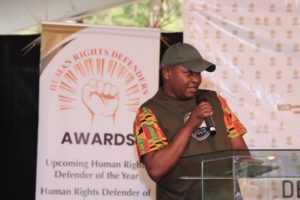
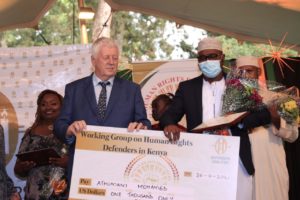
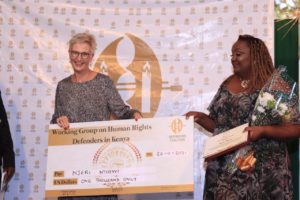
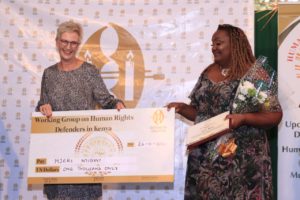
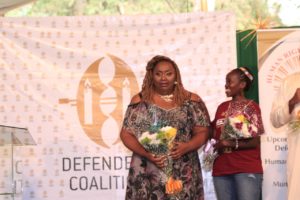
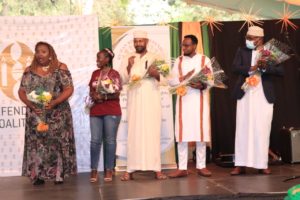
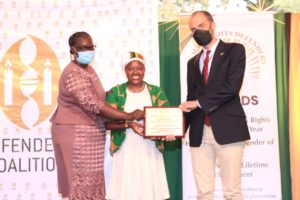
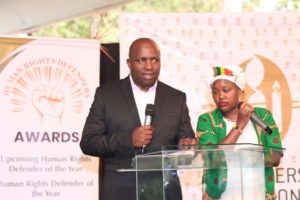
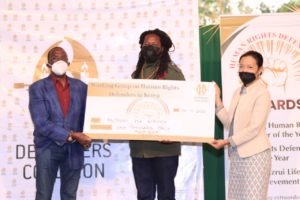
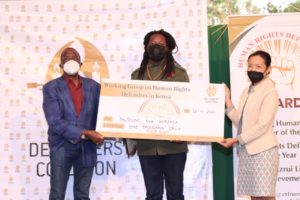
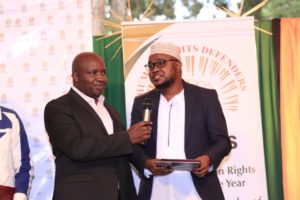
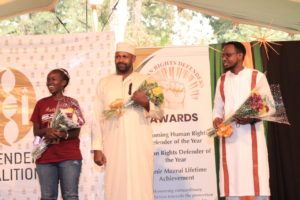

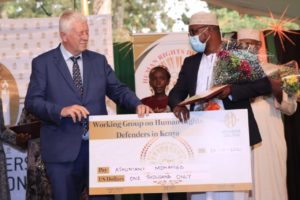
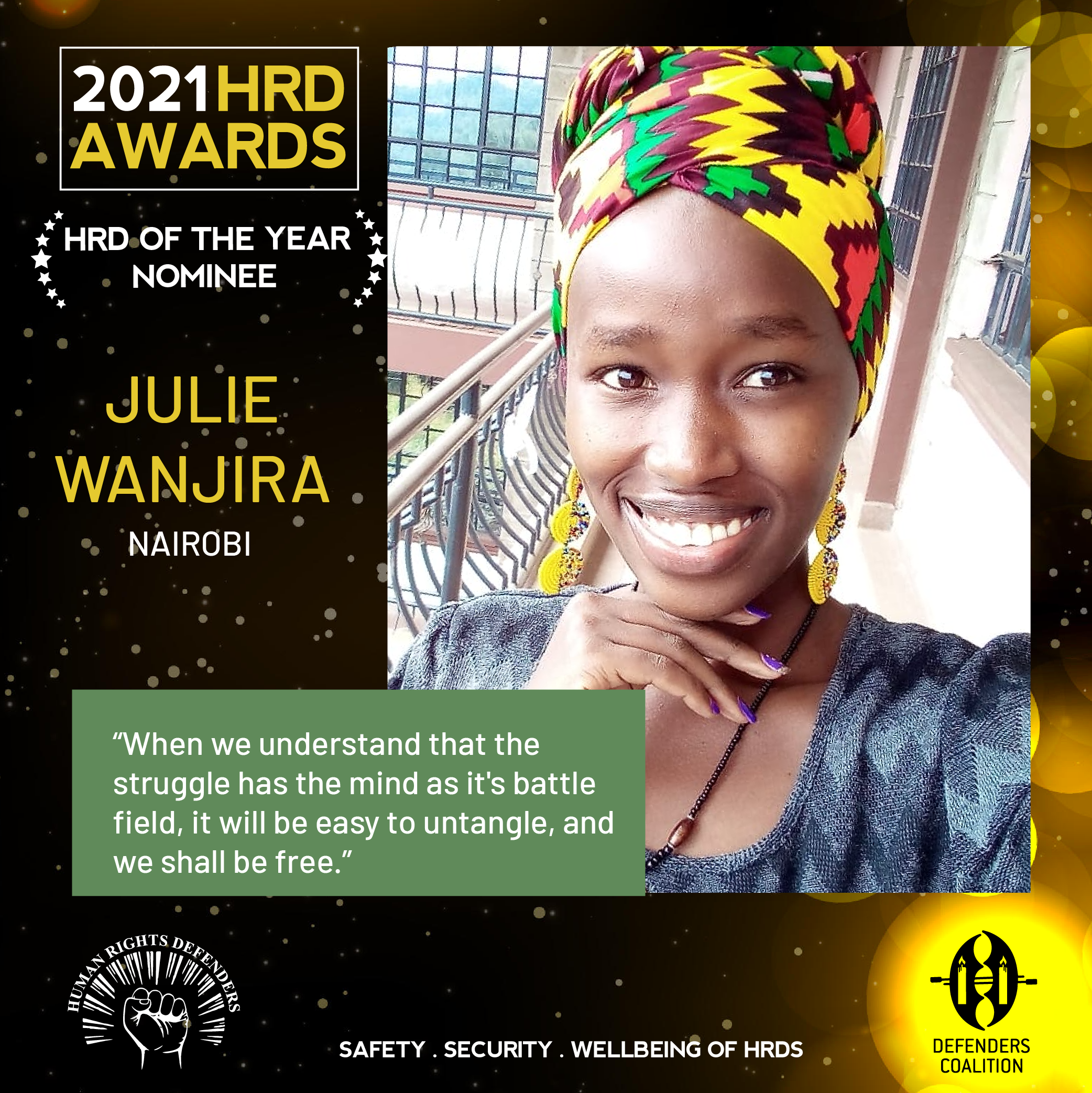
Mzalendo Wanjira is a woman Human Rights Defender from Mathare, Nairobi County. She is a firm believer in an egalitarian society, equal rights and justice for all. She believes that society should be a safe space for women, children and the poor young men.
The same way human rights are inalienable to all human beings, so should social justice and dignified lives. She is a 3rd year student at the University of Nairobi, studying international relations and diplomacy and also trying her hand at entrepreneurship.
Her peregrination in activism started 6 years ago when Mathare Social Justice Centre (MSJC) was being formed. She got a space that helped her make peace with the murder of her elder brother, Damason Irungu who was executed by Pangani police station officers. The members of Mathare Social Justice Centre gave her hope and made her realize that there was someone who cared and wanted to stop the criminalization and butcheries of youths by the bullet in Mathare and other peri-urban areas in Kenya. In her own words she said that it was the normalization of killings by the police that bothered her.
Together with community members, Mzalendo Wanjira started MSJC to challenge the narrative of killing young men in Mathare. They documented cases with precision to challenge mainstream media narratives about the murder of young men from Mathare.
As they documented cases, they met families experiencing the same fate, and decided to start a network of mothers who have lost their sons to the police, and women who had lost their husbands to the bullet, and thus, Mothers of Victims and Survivors Network was born. At MSJC, they realized the interconnectedness of several social issues and started different campaigns. The Maji ni Haki, Maji ni Uhai campaign, Campaign against GBV, ecological justice campaign – which also plants memorial trees for all victims of extrajudicial killings, campaign to end extrajudicial executions which she was mainly involved in. She also enjoys mentoring young kids at Matigari kids book club. Currently, Wanjira is involved in the formulation of a campaign to sensitize community members on the rights of persons with disability in her community and beyond.
Despite the numerous success, Wanjira has had downfall including constantly worrying about her safety and security post the 2020 SabaSabaMarchForOurLives Protest. Government security agencies constantly surveilled her due to her role in the success of the protest. She also struggles with organizing with minimal resources including funds and human resource to support her advocacy work to end extrajudicial executions (EJEs). She also faces character lynching by the community for advocating agains the killing of petty offenders as she believes that the right to life is absolute. She overcomes these challenges by continuously self-cultivating and educating with other activists that advance freedom and social justice rights.
Her inspiration is drawn from her community, the movement and her younger brother David. The thought of seeing the young men she has seen grow shot dead by police makes her shudder. Seeing many other young people in their own little ways fighting for the same ideals, for the right to life and social justice seriously inspires her and gives her hope for a better nation tomorrow.
Wanjira tells of actions that she has spearheaded to publicly denounce EJEs including the murder of a 60 year old Vaite and killing of Yassin Moyo in 2020. She continues to connect the murders of these two with other global phenomena such as Black Lives Matter that was associated with the endless killing of balck people in the United States e.g George Flyod. was murdered in the US and people were so concerned about EJEs in Kenya.. She hopes the statement she made during the 2020 SabaSabaMarchForOurLives Protest -‘When we lose our fear, they lose their power,’ will continue to inspire generations of human rights defenders time and time again.
Receiving the award will mean alot to her as an individual and a grassroots human rights defender. It will also serve as an inspiration to fellow comrades in the social justice movement. It will make a huge difference in her work especially in properly setting up the Matigari Library in the community, a step of growth from the Matigari kids book club.

